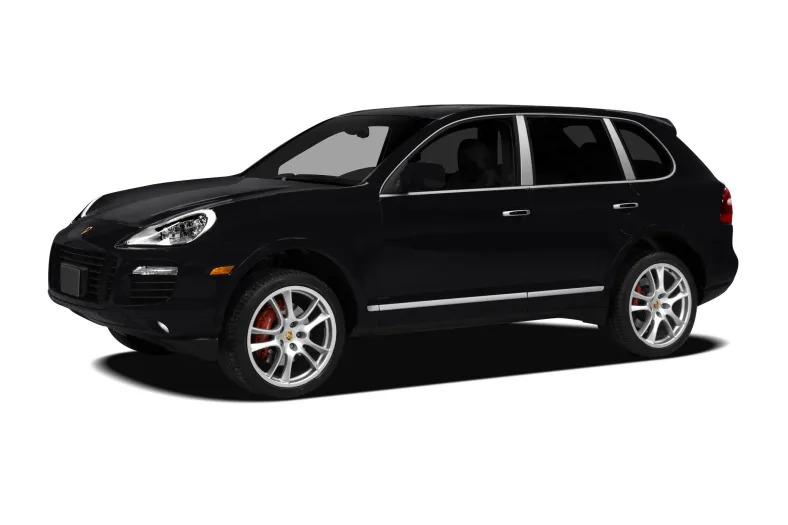GTS 4dr All-Wheel Drive
2008 Porsche Cayenne
When the Porsche Cayenne was launched four years ago enthusiasts cried blasphemy. Porsche should not build sport-utilities, they said, Porsche should build sports cars. But buyers won the vote. Cayenne had what they needed in a five-passenger SUV: more cargo space than a sedan, off-highway capability, and impressive towing capacity. They found the Cayenne technologically advanced and remarkably fast, as Porsches are supposed to be. So, they wondered, why all the hand wringing? Cayenne's balance of style, performance, and sport-utility virtues were compelling, and it quickly became a success story for the small manufacturer of legendary sports cars. When Porsche launched Cayenne as a 2003 model, executives said they hoped to sell 20,000 of the SUVs a year. Clearly, these projections were conservative. Last year, Porsche sold more than 50,000 Cayennes. More than 150,000 have been sold in the past four years. Now, redesigned for 2008, sales of the new version have taken off, and overall Porsche sales in the U.S. hit record levels the summer of 2007. The Cayenne has been a boon for Porsche's financial planning. Its ongoing success smoothes over wildly fluctuating sports car sales, which tend to follow the consumer confidence index. Cayenne's success is helping Porsche do what enthusiasts want: develop and build great sports cars. Enough hand-wringing already.
For 2008, the Porsche Cayenne has been significantly improved, and Porsche is calling it a second-generation version. We can report the driving dynamics of the 2008 Cayenne models are substantially improved over the high bar set by the previous models. This was accomplished by using the latest technology and high-quality engineering and manufacturing. Porsche Stability Management has been enhanced, Dynamic Chassis Control is available, and there's a new Sport mode available for all models and powertrains.
Each of Cayenne's three available engines is bigger and substantially more powerful for 2008. Benefiting from direct fuel injection, each engine is more fuel-efficient, as well, though on the window stickers it's a wash due to more stringent EPA test procedures instituted for all 2008 vehicles.
Grabbing headlines is the 2008 Porsche Cayenne Turbo, boasting 500 horsepower and 516 pound-feet of torque from its new twin-turbocharged 4.8-liter V8 and capable of propelling this SUV from 0-60 mph in just 5.1 seconds. It's faster and more dynamic than the previous Cayenne Turbo.
But the bigger gain, in our view, is with the entry model, which comes with a new 3.6-liter V6 that produces 290 horsepower and 283 pound-feet of torque, capable of propelling it from 0 to 60 mph in less than 8 seconds (and in 7.5 seconds when equipped with the standard six-speed manual transmission).
The popular Cayenne S gets more power, as well, serving up 385 horsepower and 369 pound-feet of torque from its new 4.8-liter V8.
More important than the new engines (though less useful for bragging rights) are advances in active safety: An available system called Porsche Dynamic Chassis Control nearly eliminates body roll, or lean, in turns, improving handling, comfort, and active safety, while providing enhanced …
Full Review
Full Review
Cayenne's balance of style, performance, and sport-utility virtues were compelling, and it quickly became a success story for the small manufacturer of legendary sports cars. When Porsche launched Cayenne as a 2003 model, executives said they hoped to sell 20,000 of the SUVs a year. Clearly, these projections were conservative. Last year, Porsche sold more than 50,000 Cayennes. More than 150,000 have been sold in the past four years. Now, redesigned for 2008, sales of the new version have taken off, and overall Porsche sales in the U.S. hit record levels the summer of 2007. The Cayenne has been a boon for Porsche's financial planning. Its ongoing success smoothes over wildly fluctuating sports car sales, which tend to follow the consumer confidence index. Cayenne's success is helping Porsche do what enthusiasts want: develop and build great sports cars. Enough hand-wringing already.
For 2008, the Porsche Cayenne has been significantly improved, and Porsche is calling it a second-generation version. We can report the driving dynamics of the 2008 Cayenne models are substantially improved over the high bar set by the previous models. This was accomplished by using the latest technology and high-quality engineering and manufacturing. Porsche Stability Management has been enhanced, Dynamic Chassis Control is available, and there's a new Sport mode available for all models and powertrains.
Each of Cayenne's three available engines is bigger and substantially more powerful for 2008. Benefiting from direct fuel injection, each engine is more fuel-efficient, as well, though on the window stickers it's a wash due to more stringent EPA test procedures instituted for all 2008 vehicles.
Grabbing headlines is the 2008 Porsche Cayenne Turbo, boasting 500 horsepower and 516 pound-feet of torque from its new twin-turbocharged 4.8-liter V8 and capable of propelling this SUV from 0-60 mph in just 5.1 seconds. It's faster and more dynamic than the previous Cayenne Turbo.
But the bigger gain, in our view, is with the entry model, which comes with a new 3.6-liter V6 that produces 290 horsepower and 283 pound-feet of torque, capable of propelling it from 0 to 60 mph in less than 8 seconds (and in 7.5 seconds when equipped with the standard six-speed manual transmission).
The popular Cayenne S gets more power, as well, serving up 385 horsepower and 369 pound-feet of torque from its new 4.8-liter V8.
More important than the new engines (though less useful for bragging rights) are advances in active safety: An available system called Porsche Dynamic Chassis Control nearly eliminates body roll, or lean, in turns, improving handling, comfort, and active safety, while providing enhanced …
Hide Full Review
Retail Price
| Engine | 4.8L V-8 |
| MPG | 11 City / 17 Hwy |
| Seating | 5 Passengers |
| Transmission | 6-spd man w/OD |
| Power | 405 @ 6500 rpm |
| Drivetrain | all wheel |


